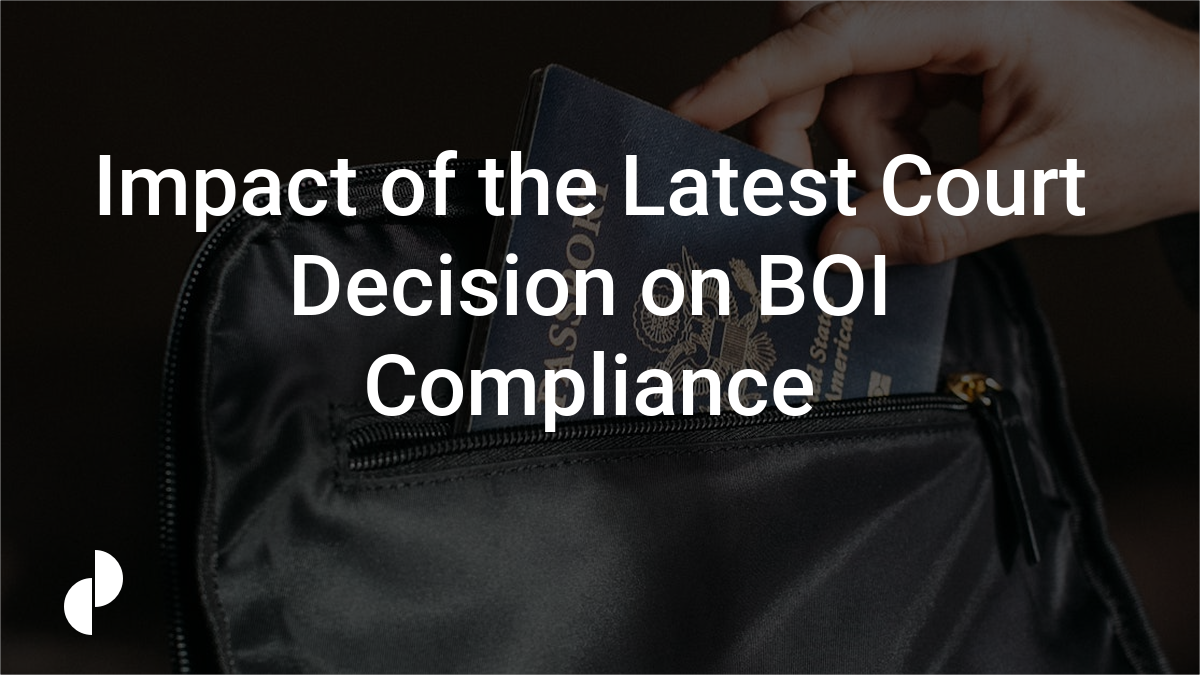< Back to the Insights Gallery
Impact of the Latest Court Decision on BOI Compliance
Published on February 19, 2025

The Corporate Transparency Act (CTA), enacted in 2021, has been at the center of significant legal activity over the past year. With several court challenges and nationwide injunctions affecting businesses’ obligations to disclose Beneficial Ownership Information (BOI), the final nationwide injunction was recently lifted. This development essentially restarts the enforcement of BOI reporting requirements and highlights the importance of staying informed about upcoming deadlines and potential compliance pitfalls. In this article, we explore the background of the CTA, recent court decisions that led to delays, and the steps businesses should take to remain compliant. We also discuss how The Phillips Group can offer support during this rapidly changing regulatory landscape.
Background on the Corporate Transparency Act (CTA)
The CTA was introduced as a critical piece of legislation intended to combat money laundering, terrorist financing, and other illicit financial activities. It requires corporations, limited liability companies, and other similar entities—called “reporting companies”—to disclose details about their beneficial owners. These details often include full legal names, addresses, and forms of official identification. The main goal is to increase transparency about who truly controls corporate entities.
Originally, most CTA reports were scheduled to be filed by early 2025. However, enforcement timelines shifted multiple times due to legal challenges. Penalties for willful violations can be severe, including daily fines of over $600, up to a maximum of $10,000, and even imprisonment for up to two years. This underscores how critical it is for entities to stay on top of these requirements and meet all deadlines once they are firmly established.
Key Court Decisions Affecting BOI Compliance
In early 2025, the compliance landscape was thrown into uncertainty when a federal district court in the Eastern District of Texas issued a nationwide injunction halting BOI reporting implementation (in the Smith v. U.S. Department of the Treasury case). That injunction prevented the Financial Crimes Enforcement Network (FinCEN), which enforces the CTA, from requiring or accepting BOI reports. The case referenced a Supreme Court decision (McHenry v. Texas Top Cop Shop, Inc.) as precedent in its ruling.
Subsequently, on February 18, 2025, the same court lifted its injunction—reinstating the CTA’s BOI reporting rules. This allowed FinCEN to confirm new deadlines for companies to file their reports. Notably, a separate lawsuit, National Small Business United v. Yellen, is still ongoing, and certain plaintiffs, in that matter, are temporarily exempt from the reporting obligation.
Revised Deadlines and Current Compliance Landscape
With the reinstatement of BOI requirements, FinCEN announced an extended deadline to help businesses adjust. Most reporting companies now have until March 21, 2025, to file any initial BOI reports or to update and correct previously filed information. However, if a company was previously granted a later deadline due to disaster relief provisions or other extension programs, that later deadline still applies.
FinCEN also signaled its willingness to extend or modify filing requirements further, particularly for smaller businesses that do not pose significant national security or money-laundering risks. The agency intends to assess whether additional extensions or rule adjustments are necessary in the coming months, aiming to reduce the regulatory burden on low-risk entities.
Practical Impact on Businesses
For many companies, especially small to medium-sized enterprises, renewed mandates to file BOI reports may appear daunting. Communicating with legal counsel, establishing thorough recordkeeping, and ensuring complete and accurate data about beneficial owners become essential tasks. Companies should also stay alert for any further updates from FinCEN that might change deadlines or reporting thresholds.
At the same time, the CTA and its current enforcement posture stand as a reminder that beneficial ownership details must be handled with care. This data can involve confidential or sensitive personal information, creating an additional layer of complexity for organizations balancing timely compliance with privacy considerations.
Expert Insight
“The recent court order doesn't surprise me at all,” says Laura Phillips, E.A., Chief Executive Officer at The Phillips Group. “Businesses should treat these reinstated BOI reporting requirements as a prompt to reevaluate their governance and data collection procedures."
Best Practices for BOI Compliance
To effectively meet these obligations, start by determining which individuals meet the definition of a “beneficial owner.” Generally, this involves anyone who has substantial control over the entity or owns a significant portion of it. Meticulous documentation of ownership information, including legal names, addresses, and verification details, is your cornerstone for accurate reporting.
It is also wise to follow FinCEN’s updates closely, given that the agency has indicated it may revise or extend filing requirements again. Setting up processes for ongoing monitoring of any changes in ownership or structure is another smart step. If an entity’s beneficial owners change, updates must be filed, and businesses should be equipped to do so promptly.
Expert(s) Information
Laura Phillips, E.A.
Title: Chief Executive Officer
Email: Laura@phillipsgrouptax.com
Laura Phillips is the Co-Founder and CEO of The Phillips Group, leveraging 15+ years of experience in healthcare-focused accounting and tax management. She specializes in guiding businesses through complex compliance requirements and developing technology-driven financial strategies.